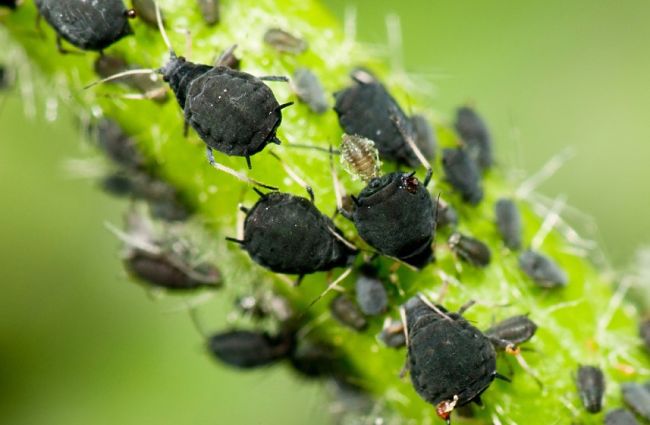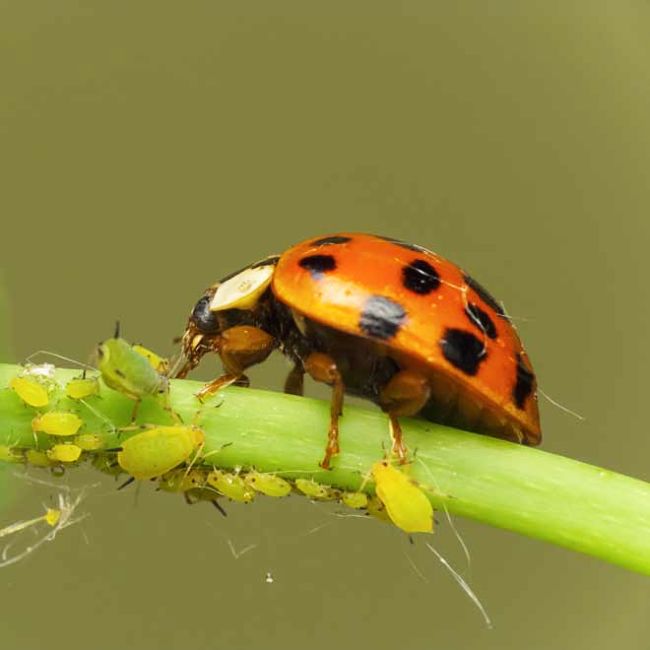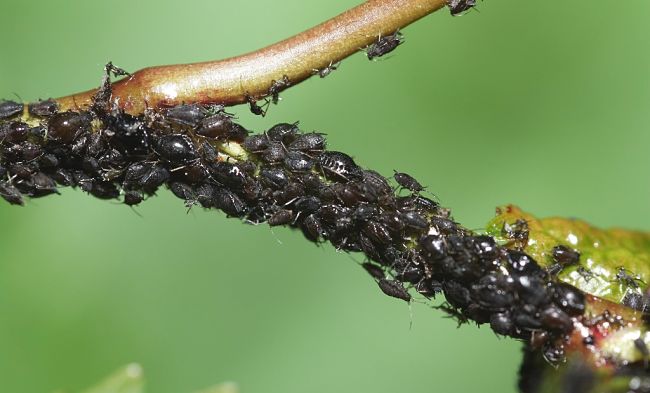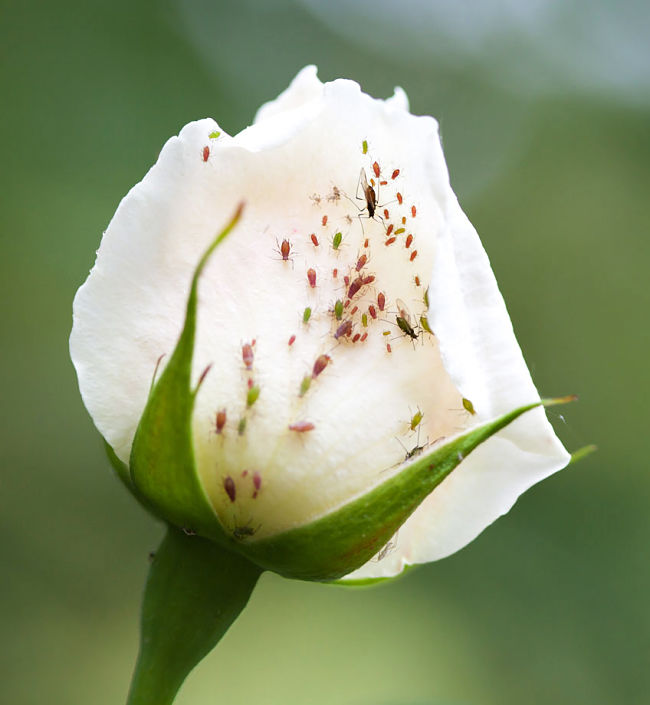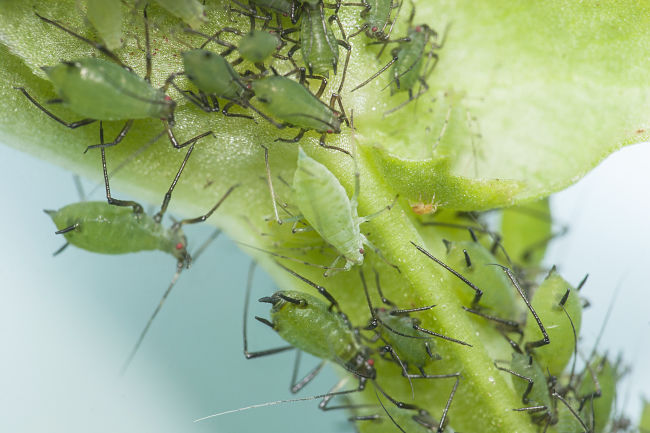Get Rid of Aphids Naturally, Organically on Plants, Roses, Tomatoes
It is essential that aphids are controlled as soon as they appear in your garden as they suck sap from the plants, weakening them, spreading disease and stopping flowers and buds from developing.
The good news is that there are many natural and organic methods for controlling aphid infestations that are cheap and effective.
The first point is that aphids are generally only effective if plants are weakened in some way and growing healthy strong and resistant plants is the key defence.
The second point is to apply the control early as soon as your see any signs of aphids.
A small pioneer infestation is much easier to control by snipping off the affected branch or killing the aphids by rubbing with your fingers.
Similarly the aphids have to come from somewhere and it pays to look for their home base elsewhere is your garden or your neighbors garden.
This article outlines the best method to get rid of aphids naturally and organically focusing on roses and tomatoes, but including other plants.
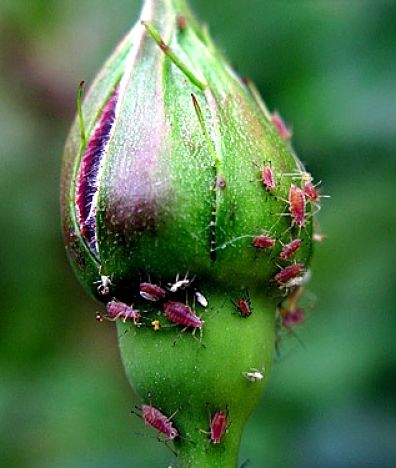
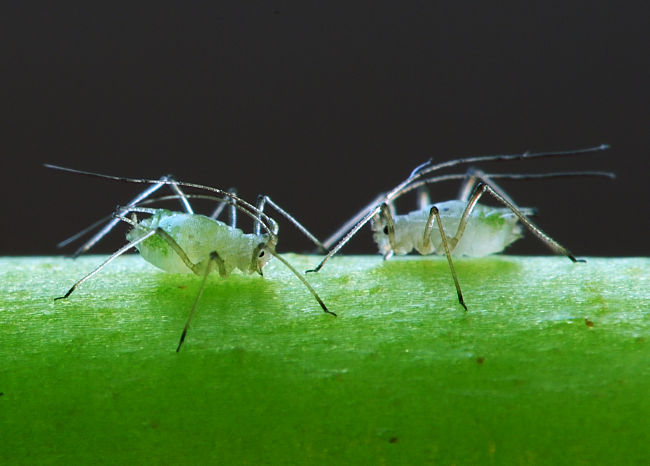
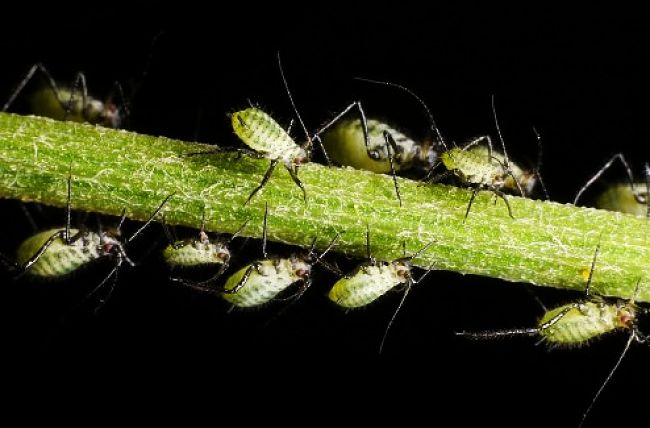
What are Aphids
Aphids are tiny, soft-bodied, pear shaped insects, which are generally about 2 – 4 mm long. Aphids often cluster on flower buds and young shoots or underneath new leaves, and they can be hard to find. The various species vary in color from yellow to green to black.
Aphids attack fruit trees, camellias, chrysanthemums, annuals roses, other ornamentals and a wide range of vegetables such as tomatoes, pumpkins, beans and peas.
Adult mature aphids have wings and can fly in to attack your plants. Small colonies can multiply very quickly in warm weather, and very large infestations can expand rapidly to engulf and smother all the new growth on a plant in a few of days.
Look for signs of natural predators on aphids such as ladybirds and parasitic wasps, which may be the first signs that you have an infestation.
Strong insecticides used to kill aphids can also kill these natural control insects. The wasps lays eggs inside the aphid killing them and ladybird larvae feed voraciously on aphids.
Both of these predators will control aphid numbers and you can sometime buy ladybird beetles as natural control agents in some area (check with your local nursery). Ants are also a give away that aphids may be lurking under leaves, as aphids 'herd' aphids for food.
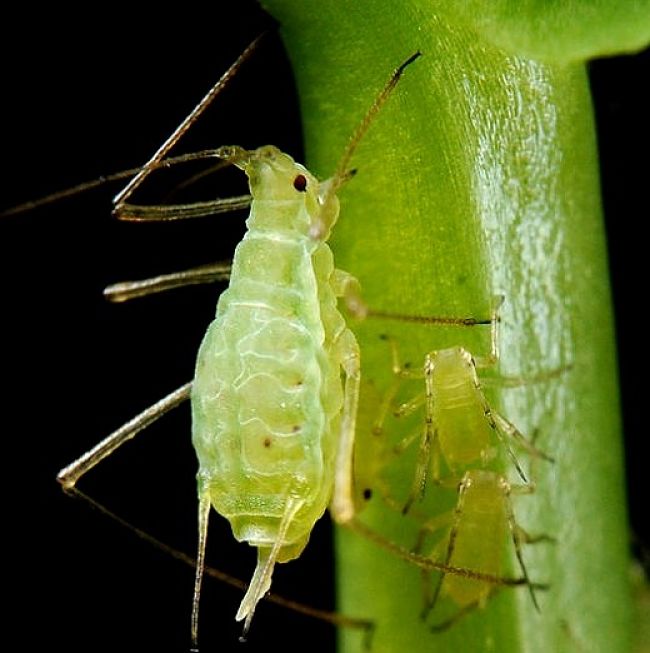
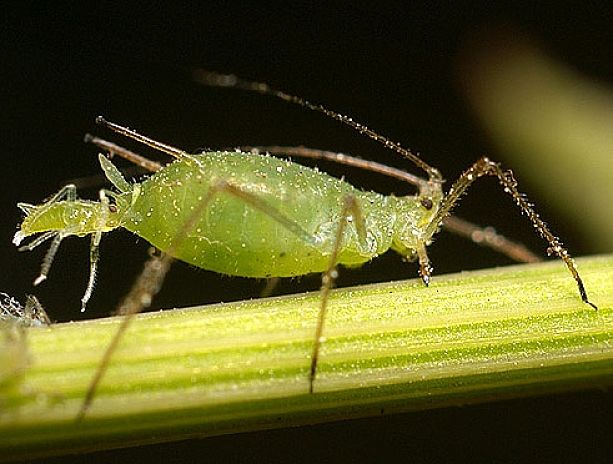
Life Cycle of Aphids
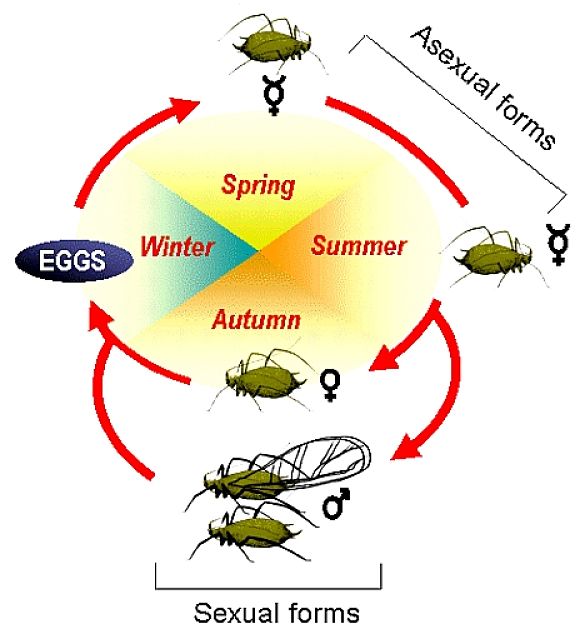
The life cycle of aphids is weird. Aphid populations are exclusively females and males appear only in late autumn just before mating and laying of eggs. Overwintering eggs hatch in the spring into females.
Offspring are produced using a form of asexual reproduction without fertilization and the offspring are essentially cloned from their mothers. The eggs and embryos develop within the mothers' ovarioles, and are born live at the first instar female nymph stage. This enables rapid expansion of populations throughout the summer months, with each female hatched in spring producing thousands of descendants.
In autumn, the aphids produce sexual females and males, that mate and lay eggs. Some species produce winged females in the summer months, probably triggered by low food quality or poor conditions for the colony. The winged females migrate to start new colonies on a new plant.
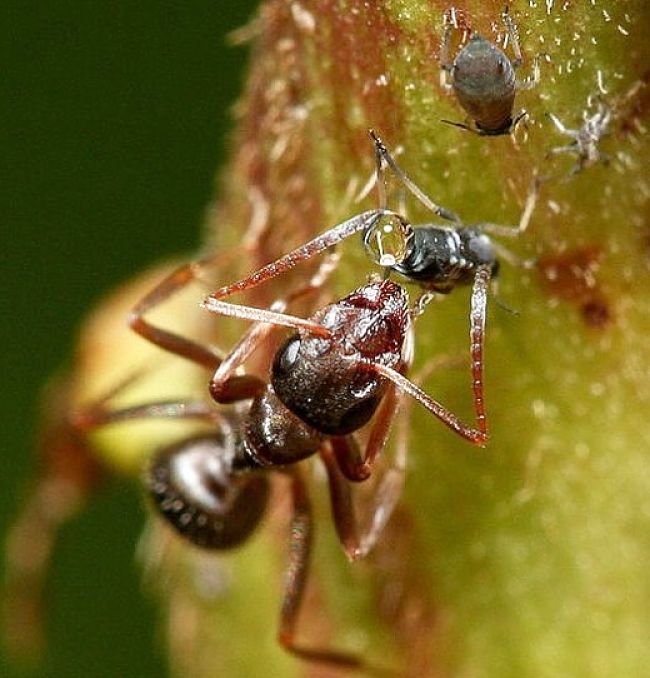
Symptoms of Aphid Attack of Plants
Buds on roses and other flowers may fail to open, shoots may fail to develop and new leaves can become twisted and distorted. All new growth at the tips of branches may be stunted. The aphids may be hard to see as they are tiny and may occur on the underside of leaves.
Aphids excrete a substance called honeydew, that is fed on by ants and ant trails are often a sign of aphid infestations.
Ladybirds also feed on aphids and this is another sign. Aphids and their honeydew also creates an environment on that encourages sooty mold fungus infections and if you see signs of this you will often find aphids on the plants.
Natural and Organic Methods for Controlling Aphids
Manual Squishing of Aphids - This works well for small infestations and is done by rubbing your fingers over the affected areas. If you don't want to squash them you can use gloves and pick the aphids off the leaves, buds and stem and place in soapy water to drown. Always look on the underside of leaves so that none are missed.
Remove of Aphids with Forceful Stream of Water - Using a hole adjust the spray fitting to form a fine strong stream and use this to blast the aphids of the leaves and buds. Don't make the stream too strong or it will damage the plants. This should be repeated 1-3 times once or twice a week and is generally effective provided you spray all the areas that are infested. You can use a normal garden hose but you may consider buying a special attachment that produces the required jet of water or a pressure spray pack.
Using Companion planting to Control Aphids - Plant garlic plants among other plants that aphids are attracted to such as roses and tomatoes can keep aphids at bay. Many herbs, such as hyssop, sage, dill, lavender, ginger, rosemary and thyme also help to discourage aphids if planted near to susceptible plants. Many flowers are also effective in repelling insects:
- Zinnia
- Dahlia
- Verbena
- Tuberous begonia
- Larkspur
- Hollyhock
- Cosmos
- Mum
- Aster
- Nasturtium
Nettle Sprays to Gets Rid of Aphids - Making a spray from common stinging nettles has been reported as helping to control aphids. Soak about half a pound (250 gm) young nettles in a bucket of water for about a week. Strain the liquid and use undiluted as a spray applied directly on the aphids - they hate it.
Rhubarb Sprays to Control Aphids - The oxalic acid contained in rhubarb leaves can help to control aphids, especially for infestations on roses. Slice about one pound (500 gm) of fresh rhubarb leaves into pieces and place in an old saucepan or pot. Add two pints (1 litre) of water and boil for about 30 minutes. Allow to cool and add 1 teaspoon of soap flakes, or gated bar soap dissolved in half a pint (250 ml) of warm water. The soap acts as the wetting agent and also helps kill the aphids. Stir the mixture thoroughly, strain through cloth and use undiluted as a spray. Remember that Rhubarb leaves are toxic so store the mixture away from children and pets and use a face mask when spraying.
Introduce Ladybirds and other Insects to Control Aphids - Beneficial insects, such as green lacewings, parasitic wasps and ladybird beetles, act as biological control agents for controlling aphid infestations in your garden. You may have to do some searching but these insects are often available from local garden stores or online.
Organic Herb and Oil Sprays to Control Aphids - Aphids can be controlled with strong sprays such as garlic-pepper tea, neem or other natural horticultural oils, orange-derived sprays and natural insecticides such as pyrethrin. But remember that these sprays kill all insects including the ones that eat aphids and so should only be used as a last resort with very large infestations
Soap Spray - Mix the following ingredients in a spray bottle :
3 drops of liquid soap (not detergent)
1/4 cup vegetable oil
4 cups warm water
Shake the mixture well, and spray on the leaves, buds and stems of infected plants. Spray once of twice a week directly on the aphids. Make sure you do not used too much soap as it can burn the plant.
Ginger Spray - In a bottle, mix the following:
1/2 cup finely chopped or grated ginger
2 cups of warm water
Let the ginger sit for a couple of hours, then shake well and sieve through cloth into a spray bottle. Use the liquid to spray the infected parts of the plants. This solution will repel the aphids, but not necessarily kill them. Spray the plants once or twice a week.
Eucalyptus oil and Tea Tree Oil - These oils (not containing alcohol) can be sprayed directly onto roses to reduce infestation by repelling them. Be careful not to harm the plants. You can also soak cotton buds with these oils and place on the plants.
Related Articles
=> Citrus Fruit Tree Care - Maintenance, Problems and Organic Remedies
=> Growing Quince Trees, Health Benefits and Best Quince Recipes
=> Best Organic Foods to Buy and Grow Yourself to Avoid Residues
=> Best Herbs to Grow Indoors, Outdoors | Nutritious, Healthy Herbs
=> 10 Best Tomato Growing Tips for Gardens and Pots
=> How to Grow Vegetables in Pots and Containers - Tips, Guides, Facts
=> Fastest Growing Vegetables Guide - Growth Rate Charts, Early Yield Tips
=> Shiitake Mushrooms Benefits, Best Recipes, Growing Shiitake
=> Growing Vegetables in Vertical Gardens, Hanging Pots and Baskets
=> How to Grow Kumquats, Health Benefits and Best Cumquat Recipes
